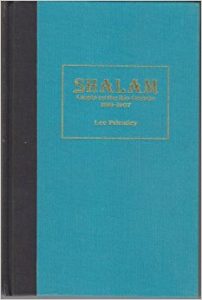 For those interested in the history of Shalam, a Faithist compound in the late 1800’s, early 1900’s, you might want to read the small book SHALAM — Utopia on the Rio Grande 1881-1907 by Lee Priestley. These are available in paperback and hard cover.
For those interested in the history of Shalam, a Faithist compound in the late 1800’s, early 1900’s, you might want to read the small book SHALAM — Utopia on the Rio Grande 1881-1907 by Lee Priestley. These are available in paperback and hard cover.
The book is about the history of Shalam, a Faithist compound that failed. It had a pretty good start, but Mir Mahvar, Mir Salazar and angelic beings have stated that what was attempted was started too soon. The people were zealous and generous with what they had. One man contributed his entire fortune. But disease killed off some of the inhabitants, and children who had been brought to the compound were sent to orphanages, and possibly to other Faithist communities of the time.
As we know, the reality of Shalam will be experienced in the future, and is connected to what adherents of Faithism know as Terra Nova. Terra Nova is spoken of as the place of cultivation, learning and perfection. Many children have already been brought to Terra Nova from war-torn areas of the world, orphans, lost children, and so on, with many adults as well. All inhabitants are being nurtured in the Truth under the celestial beings and other responsible ones who have been brought up to that plane of existence. As children of the Creator living on earth, being taught directly by the angelic beings, we know that it is best to wait on Jehovih’s timing, and never attempt to step ahead of His plans.
Shalam Colony, while unique in its purpose, was never alone in its efforts. there have been hundreds of such communities in the United States, most of them failures. Any list of incomplete, for many were born and declined outside of public record. Most were short lived.
Some found brotherhood; some found strife,
Few found a workable way of life.(page 52; poem quoted to author by Katherine D. Stoes)
The book has some illustrations and black and white photographs. It has 64 pages. It is copyright 1988 and published by Texas Western Press – University of Texas at El Paso.
